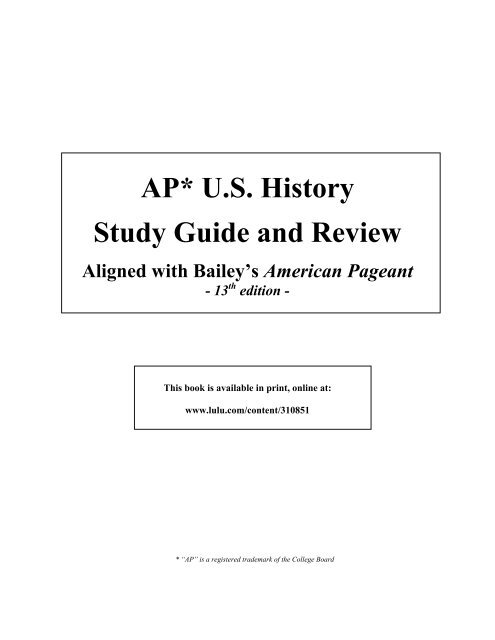Key Terms/PeopleNew Freedom (1912): Platform of reforms advocated by Woodrow Wilson in his first presidential campaign, including stronger antitrust legislate to protect small business enterprises from monopolies, banking reform, and tariff reductions.New Nationalism (1912): State-interventionist reform program devised by journalist Herbert Croly and advocated by Theodore Roosevelt during his Bull Moose presidential campaign.
Underwood Tariff (1913): This tariff provided for a substantial reduction of taxes and enacted an unprecedented, graduated federal income tax.
Federal Reserve Act (1913): An act establishing twelve regional Federal Reserve Banks and a Federal Reserve Board, appointed by the president, to regulate banking and create stability on a national scale in the volatile banking sector.
Federal Trade Commission Act (1914): A banner accomplishment of Woodrow Wilson's administration, this law empowered a standing, presidentially appointed commission to investigate illegal business practices in interstate commerce like unlawful competition false advertising, and mislabeling of goods.
Clayton Anti-Trust Act (1914): Law extending the anti-trust protections of the Sherman Anti-Trust Act and exempting labor unions and agricultural organizations from antimonopoly constraints.
holding companies: A company that owns part or all of the other companies' stock in order to extend monopoly control. Often, a holding company does not produce goods or services of its own but only exists to control over companies.
Workingmen's Compensation Act: Passed under Woodrow Wilson, this law granted assistance to federal civil-service employees during periods of disability. It was a precursor to labor-friendly legislation passed during the New Deal.
Adamson Act (1916): This law established an eight-hour day for all employees on trains involved in interstate commerce, with extra pay for overtime.
Jones Act (1916): Law according territorial status to the Philippines and promising independence as soon as a 'stable government' could be established.
Tampico Incident (1914): An arrest of American sailors by the Mexican government that spurred Woodrow Wilson to dispatch the American navy to size the port of Veracruz in April 1914.
Central Powers: Germany and Austria-Hungary, later joined by Turkey and Bulgaria, made up this alliance against the Allies in World War I.
Allies: Great Britain, Russia, and France, later joined by Italy, Japan, and the United States, formed this alliance against the Central Powers in World War I.
U-boats: German submarines, named for the German Unterseeboot, or 'undersea boat,' proved deadly for Allied ships in the war zone. U-boat attacks played an important role in drawing the United States into war.
Lusitania: British passenger liner torpedoed and sank by Germany on May 7, 1915.
Herbert Croly
Herbert David Croly (January 23, 1869 – May 17, 1930) was an intellectual leader of theprogressive movement as an editor, and political philosopher and a co-founder of the magazine The New Republic in early twentieth-century America. His political philosophy influenced many leading progressives including Theodore Roosevelt, as well as his close friends Judge Learned Hand and Supreme Court Justice Felix Frankfurter.
Louis Dembitz Brandeis (November 13, 1856 – October 5, 1941) was anAmerican lawyer and associate justice on the Supreme Court of the United States from 1916 to 1939.
José Victoriano Huerta Márquez (22 December 1850 – 13 January 1916) was a Mexican military officer and president of Mexico. Huerta's supporters were known as Huertistas during the Mexican Revolution. Huerta is still vilified by modern-day Mexicans, who generally refer to him as El Chacal ('The Jackal') or El Usurpador ('The Usurper').
Venustiano Carranza de la Garza (29 December 1859 – 21 May 1920) was one of the leaders of the Mexican Revolution. He ultimately became President of Mexico following the overthrow of the dictatorial Victoriano Huerta regime in the summer of 1914, and during his administration the current constitution of Mexico was drafted. He was assassinated near the end of his term of office at the behest of a cabal of army generals resentful at his insistence that his successor be a civilian.
José Doroteo Arango Arámbula (5 June 1878 – 20 July 1923) – better known by his pseudonym Francisco Villa or his nickname Pancho Villa – was one of the most prominent Mexican Revolutionary generals.
John Joseph 'Black Jack' Pershing (September 13, 1860 – July 15, 1948), was a general officer in the United States Army who led the American Expeditionary Forces in World War I.
Charles Evans Hughes, Sr. (April 11, 1862 – August 27, 1948) was an American statesman, lawyer and Republican politician from New York.




